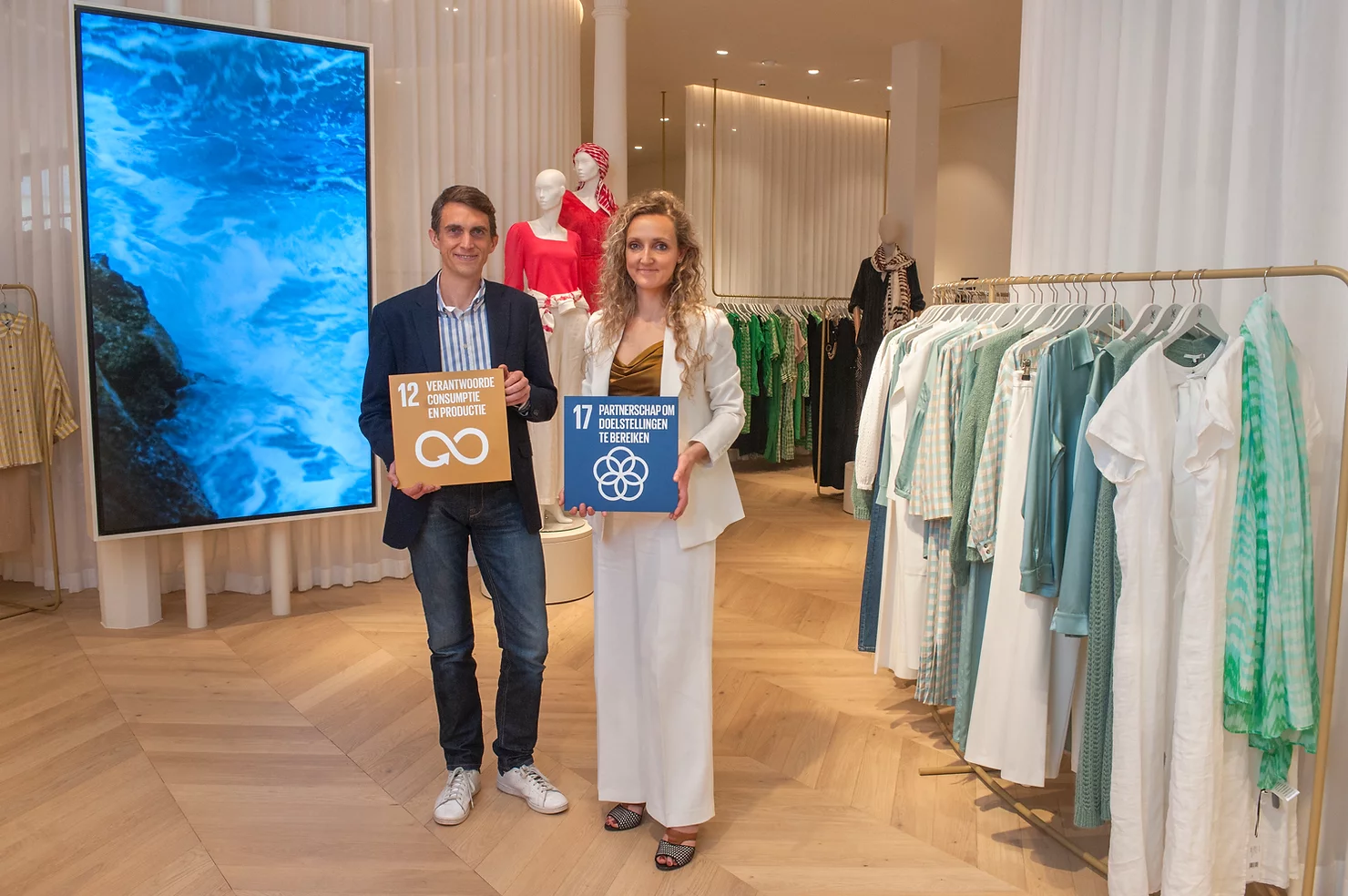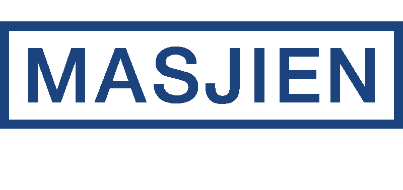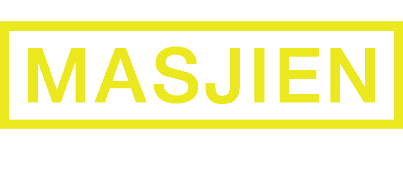CFO Magazine in conversation with Jasmien and Jarno on sustainability & finance at Xandres.
Interview with Jasmien Wynants and Jarno Devedeleer (CFO Xandres) in CFO Magazine, written by Niels de Boysere
Finance supports sustainable ambitions Xandres
Belgian fashion house Xandres published its first sustainability report at the end of 2021. Remarkable: the ambitions of shareholder Damartex Group are prominently featured but Xandres also managed to set goals and priorities from its own DNA. CFO Jarno Devedeleer and Sustainability Manager Jasmien Wynants explain.
Turnover: 25 million euros; employees: 110

At the end of 2021, Xandres launched its first sustainability report. Although the Belgian fashion house is part of Damartex Group, which as a listed company has been reporting non-financial information since 2016, it chose to outline its own sustainability path and also immediately included it as a strategic pillar. A conscious choice for CFO Jarno Devedeleer. “We have been working on the sustainability of our products and the production chain for some time,” he says. “That makes it possible to start choosing or prioritizing things from our DNA. Of course, we remain part of Damartex Group. And it has already formulated clear, strategic pillars for sustainability. So from a group perspective, there are different initiatives going on that inspire us but that happens just as much the other way around.
“Mandate at the highest level”
In order to make the sustainability ambitions a reality, a Sustainability Manager was recruited in early 2021. Wynants felt strongly about this trajectory and the ambitions of Xandres, so the collaboration was quickly successfully launched. “We chose to build our own strategic section on top of the already existing framework,” says Wynants. “To do this, we concretely looked at: who is Xandres and what is our identity apart from sustainability? This quickly led us to quality, craftsmanship, longevity, etc. We translated these issues into our own sustainability strategy, set our own objectives and produced our own report. The group has been an inspiration for this, but we have set out our own guidelines from within Xandres. Something like this has to come from the inside. If that is not the case, it is not ingrained enough in the company and the chance is too great that the subject will slip into the background too quickly. This all departed from management, which is precisely why it was given a separate mandate.”
From code of conduct at suppliers…
“We know that there are numerous things coming our way legislatively, without already having a concrete idea of exactly what everything will look like,” says Wynants. “And if you look at our various stakeholders, you see that we are being encouraged, especially B2B-wise, to act on this. We are doing this in the first phase of our sustainability strategy, for example, very concretely towards our suppliers. We developed a ‘framework for sustainable procurement’ to have a clear grip.” It is important to note that Xandres does not run its own production sites but rather works with production partners. Of those, 40 percent are located in Macedonia.
“Those production partners are asked today to sign a Code of Conduct as a first step towards a responsible supply chain. This indicates that there is no child labor, no exhaustive working hours or unfair working conditions. The Code of Conduct is a promise from them to us, and is based on the general principles of Corporate Social Responsibility. Step two was to train our procurement team so they would have the right information in order for them to ask critical questions of suppliers, have the right templates, … We started doing that last year and are now gradually expanding by training our design and procurement team at the Sustainable Fashion Academy.”
… towards sustainable auditing
Wynants: “You need this if you want to validate what is happening at the production sites. This is a target that was set by the group on the one hand, but which we also contribute to by requesting audit reports from a number of our strategic partners and having them carried out. This is why we joined ICS (Initiative for Compliance and Sustainability). We have since had two of our main production partners audited and they both received a good score.”
Devedeleer adds: “Of course, just because an official attestation has been obtained does not mean it’s a closed case. It is important that we build a long-term relationship with the producer. This is primarily about trust and delivering quality, but also about sustainability. We must not forget that an audit is a snapshot. For us, it’s about ensuring that our suppliers score well on a permanent basis.” Audits are accompanied by Corrective Action Plans. “It is important that there is continuous improvement,” states Wynants. “After every audit there will be working points and then it is necessary to have a conversation with each other and follow up properly.” From a finance perspective, Devedeleer sees this as an additional dimension in negotiations with suppliers. “It will be one of the evaluation criteria that will give us a lot more objectivity about the supplier,” he says. “For this, by the way, we have also adapted our ERP system because it adds quite a lot of administration for the purchasing team.”


CFO as a realist
“We know that there are numerous things coming our way legislatively, without already having a concrete idea of exactly what everything will look like,” says Wynants. “And if you look at our various stakeholders, you see that we are being encouraged, especially B2B-wise, to act on this. We are doing this in the first phase of our sustainability strategy, for example, very concretely towards our suppliers. We developed a ‘framework for sustainable procurement’ to have a clear grip.” It is important to note that Xandres does not run its own production sites but rather works with production partners. Of those, 40 percent are located in Macedonia.
“Those production partners are asked today to sign a Code of Conduct as a first step towards a responsible supply chain. This indicates that there is no child labor, no exhaustive working hours or unfair working conditions. The Code of Conduct is a promise from them to us, and is based on the general principles of Corporate Social Responsibility. Step two was to train our procurement team so they would have the right information in order for them to ask critical questions of suppliers, have the right templates, … We started doing that last year and are now gradually expanding by training our design and procurement team at the Sustainable Fashion Academy.”
CFO Devedeleer himself is mainly involved in the strategic process for a more sustainable company. “Our team mainly comes in to support reporting and setting the right KPIs,” he says. “As CFO, I then have to intervene myself in the balancing act between planet, people, and profit. Sometimes you also have to push choices if our result cannot support certain ambitions. Of course we want to be as sustainable as possible, and we might ask ourselves questions about the production of our clothing abroad… But in terms of cost efficiency alone, there is no doubt about that. Let alone the knowledge that has been acquired and the specialization, as well as the supply of raw materials. You would have to map out the entire chain again. In addition, you are sometimes forced to follow certain flows because of tax issues or customs problems. In addition, of course, I have to ensure that resources are freed up, because this process does have a certain cost. An additional cost. You have to be able and dare to set up this exercise as an organization. Do you charge everything to the customer if you only want environmentally friendly fabrics? And how do we finance all of this? Ultimately, this is a classic exercise that simply belongs to our role…”
“When we choose not to participate in actions like Black Friday but resolutely and permanently opt for Green Friday (counter-movement to the shopping frenzy on Black Friday, and an action against overconsumption and impact on the environment, ed.), this has a financial backlash. Nevertheless, we see this as a very positive story that we are very consciously choosing. This is an example where we are not just looking from financial criteria, but clearly throwing sustainability in the mix…”
“Daring to question the system”
Wynants is very clear about the usual suspect in sustainability, ecology,. “For sustainable fashion, we actually have to question the whole system. About a third of the ecological impact of a garment lies with the consumers. We have to systematically extend the life span so that we can get out of the fast fashion system. Sustainability is more than ecology. If you buy a T-shirt made of organic cotton and only wear it three times before you throw it away, wouldn’t you have been better off buying a non-biocotton one that you put on many times? We also see a role for ourselves as a brand there. We need to get our customers on board with this way of thinking. To raise awareness, we fall back on a Repair & Care program to give people tips on maintenance, on washing and ironing the article, but also, for example, if there is a hole in the clothing to have it adjusted. Xandres is also one of the few brands where you have a lifetime free repair. That too has come from the DNA of the company: we stand for quality and longevity and we want to go the extra mile in that.”
Devedeleer: “That’s a pure cost but of course we don’t leave it at that. It is important to make the most of the life cycle of a piece. In our flagship store in Antwerp, we are also currently testing an application where our saleswomen can see the clothing history of consumers and help them choose an article. If there are combination possibilities with an article that is already hanging in the consumer’s closet, we want to give that advice. In this way, we go against pure consumption but also contribute to extending the life cycle of a garment.”
Finally, Xandres is also deliberately entering into partnerships to bring more sustainable clothing into stores. “We believe in collaborations and so we seek them on different levels,” Wynants explains. “We have been in the Close-The-Loop network of Flanders Circular & Flanders DC since 2018, where we collaborate with other Belgian SMEs in the field of sustainability. We get inspired by companies who, for example, started their entrepreneurial story from a principle of circular economy. In this way, we also hope to have a further impact and to inspire others because, to be clear, we are not an eco-brand. However, that does not mean that we cannot do better year after year. For example, we set concrete goals in terms of increasing the use of materials with a lower environmental impact and set up collabs that we can learn from. For example, we currently have a collaboration with Raramuri, a Belgian sandal brand that has started to work with our residual materials and has them developed into new products in social employment workshops. Not only do we learn from this, we also give a small, unknown brand the opportunity to appeal to our target group and gain exposure for it. In this way, we are also trying to have an impact.”
About Xandres
Xandres NV is a Belgian fashion company with a rich history of producing quality clothing for women from size 34 to 56. In 2016, France’s Damartex Group acquired Xandres’ operations.
About ICS
ICS is an international sector initiative to improve working conditions throughout the supply chain of retailers and brands. It consists of more than 65 multinationals from the textile, retail, footwear, electronics and furniture sectors. The members work together using the same tools to make audits reciprocal, thus combating ‘audit fatigue’, sharing knowledge and best practices. The audits themselves are conducted by ICS-accredited auditing companies but do not bring specific certifications or labels. Members do share the same rules when critical non-conformities are identified. The vast majority of ICS audits are partial or unannounced. Wynants: “Connecting our audits to ICS is a commitment we make. We do not know to what extent this audit, will become one of the mandatory audits for the textile sector and sustainability reporting. It’s hard to estimate but this will give us coherence with the expectations of the group.”
Biographies
JARNO DEVEDELEER has been CFO at Xandres since 2019. He started his career at EY and was successively in various finance roles, at Kinepolis, CDK Global, as well as one operational role Colruyt Group. At Colruyt Group he spent most of his career, over 9 years.
JASMIEN WYNANTS became Sustainability Manager at Xandres on 1 April 2021. Prior to this she worked for 8 years at Flandres District of Creativity. Wynants also holds the title of Circular Fashion Mentor at the Circular Economy Club, the international network of circular economy professionals.

